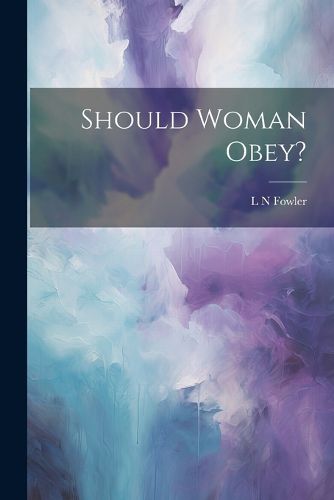Readings Newsletter
Become a Readings Member to make your shopping experience even easier.
Sign in or sign up for free!
You’re not far away from qualifying for FREE standard shipping within Australia
You’ve qualified for FREE standard shipping within Australia
The cart is loading…






First published in 1913, this work by L. N. Fowler examines the question of whether women should be obedient to men. Fowler, a British phrenologist and writer on social issues, argues that women should be equal to men in terms of rights and abilities, but that they should also recognize their natural role as mothers and caregivers. He critiques both traditional patriarchy and radical feminism, and presents a vision of gender relations based on mutual respect and cooperation.
This work has been selected by scholars as being culturally important, and is part of the knowledge base of civilization as we know it.
This work is in the "public domain in the United States of America, and possibly other nations. Within the United States, you may freely copy and distribute this work, as no entity (individual or corporate) has a copyright on the body of the work.
Scholars believe, and we concur, that this work is important enough to be preserved, reproduced, and made generally available to the public. We appreciate your support of the preservation process, and thank you for being an important part of keeping this knowledge alive and relevant.
$9.00 standard shipping within Australia
FREE standard shipping within Australia for orders over $100.00
Express & International shipping calculated at checkout
First published in 1913, this work by L. N. Fowler examines the question of whether women should be obedient to men. Fowler, a British phrenologist and writer on social issues, argues that women should be equal to men in terms of rights and abilities, but that they should also recognize their natural role as mothers and caregivers. He critiques both traditional patriarchy and radical feminism, and presents a vision of gender relations based on mutual respect and cooperation.
This work has been selected by scholars as being culturally important, and is part of the knowledge base of civilization as we know it.
This work is in the "public domain in the United States of America, and possibly other nations. Within the United States, you may freely copy and distribute this work, as no entity (individual or corporate) has a copyright on the body of the work.
Scholars believe, and we concur, that this work is important enough to be preserved, reproduced, and made generally available to the public. We appreciate your support of the preservation process, and thank you for being an important part of keeping this knowledge alive and relevant.